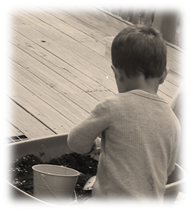by Alecia Rolling, Reflection originally Posted on March 24, 2011 at therollingacresfarm.com
 One of my favorite things about the spring is dirt. Admittedly, the smell of dirt, the feel of dirt, the sheer dirtiness of dirt bring back so many childhood joys, dreams, and memories that I cannot help but allow my own children to revel in the same experience. Academically, I understand that the experience of dirt involves more than emotions and nostalgia, for this experience is forming a valuable foundation for the future education of my children. How could I teach about the different types of soil had they never felt them? How could I teach about erosion had they never watched water run down our clay hill in the spring time? What a difficulty these tasks would be, indeed, for even with reason, a child can grasp these ideas so much the easier if there is an actual experience of them. As Pierre-Marie Emonet writes, “The soul sends [the senses] forth, as its tools of perception, of apprehension. It is by them that the soul establishes its grasp of the rich interest prepared for it in the world” (The Greatest Marvel of Nature, 12). Thus, here we are on the homestead in spring, casting our doors open and allowing our children into the brave outdoors to smell, touch, hear, see, and even taste nature in the name of education. I catch my toddler and ask him what he hears. He remarks, “the birds.” He then imitates how each sounds. I come to my four-year-old and ask what she is doing. She responds, “I see new, baby plants coming up that will be flowers for me to pick.” A thunderstorm comes in the evening, and I turn out all the lights. We see lightening, and then we hear thunder. What clamor of expectation goes up into the air as the children see lightening again and await the clash of thunder to follow!
One of my favorite things about the spring is dirt. Admittedly, the smell of dirt, the feel of dirt, the sheer dirtiness of dirt bring back so many childhood joys, dreams, and memories that I cannot help but allow my own children to revel in the same experience. Academically, I understand that the experience of dirt involves more than emotions and nostalgia, for this experience is forming a valuable foundation for the future education of my children. How could I teach about the different types of soil had they never felt them? How could I teach about erosion had they never watched water run down our clay hill in the spring time? What a difficulty these tasks would be, indeed, for even with reason, a child can grasp these ideas so much the easier if there is an actual experience of them. As Pierre-Marie Emonet writes, “The soul sends [the senses] forth, as its tools of perception, of apprehension. It is by them that the soul establishes its grasp of the rich interest prepared for it in the world” (The Greatest Marvel of Nature, 12). Thus, here we are on the homestead in spring, casting our doors open and allowing our children into the brave outdoors to smell, touch, hear, see, and even taste nature in the name of education. I catch my toddler and ask him what he hears. He remarks, “the birds.” He then imitates how each sounds. I come to my four-year-old and ask what she is doing. She responds, “I see new, baby plants coming up that will be flowers for me to pick.” A thunderstorm comes in the evening, and I turn out all the lights. We see lightening, and then we hear thunder. What clamor of expectation goes up into the air as the children see lightening again and await the clash of thunder to follow!
Connecting the Dots: The Schola Rosa curriculum provides a science program that is rich in experience and discussion. The focus of the elementary science lessons is to get students and parents outside to experience the fundamentals behind each lesson and then to discuss those fundamentals with a natural Socratic Q&A method. We want to bring children to discover the lessons on their own through observation, introducing experiment later in 4th-6th grade.
